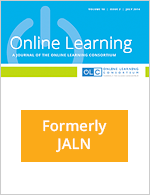Stevens Institute of Technology: WebCampus
WebCampus.Stevens, recent winner of the Sloan-C Award for Excellence in Institute-Wide Online Teaching and Learning Programming, delivers some 160 courses in six online graduate degrees and 23 graduate certificates. Taught by more than 60 mostly full-time faculty, courses have now enrolled more than 4,000 students in 37 US states and...

